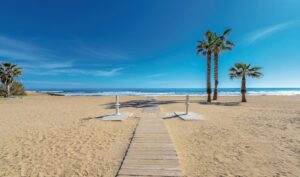UK Heatwave Record Broken: 10 Ways to Protect the Vulnerable

“A UK record has been broken for the number of consecutive September days reaching 30C (86F).” (BBC News)
“Mini-heatwave to cause ‘tropical nights’ in British first for September. The country has never experienced consecutive overnight temperatures above 68F (20C) this late in the year.” (The Telegraph)
This week’s heat wave comes with a high risk of heatstroke, especially for the elderly population. As we age, our bodies become less efficient at regulating temperature, making seniors more susceptible to the effects of extreme heat. As older adults are more likely to suffer from heat-related illnesses such as heat exhaustion and heatstroke. (Centers for Disease Control and Prevention)
“Heat-health alert upgraded to amber as temperatures hit 32C…There is an amber warning in eight of the country’s nine regions until Sunday – only the North East has a yellow one. The UK Health Security Agency’s amber alert means people of all ages could be affected, putting the NHS at risk…The hot weather comes after what has generally been regarded as cool wet summer for much of the UK.” (BBC News)
“Dr Agostinho Sousa, head of extreme events and health protection at UKHSA, said: This heat-health alert means that in the coming days we are likely to experience another sustained period of hot weather, so it’s important that everyone takes sensible precautions while enjoying the sun…Forecasted temperatures this week could primarily impact those over the age of 65 or those with pre-existing health conditions.” (MSN News)
Heat Stroke Starts at 40°C
As temperatures rise, older individuals tend to retain more heat than their younger counterparts, making this week a crucial and high-risk period for the elderly population.
“Heatstroke is a life threatening medical emergency. It’s usually caused by being outdoors in extremely hot and humid weather, but it can also be caused by being in overheated indoor spaces. It’s caused by overheating of the body to a core temperature of 40°C or higher. When not treated promptly, heatstroke can cause serious damage to the internal organs of the body, including the brain.” (Healthline)
The Two Types of Heat Stroke
Exertional heat stroke: due to intense physical exertion outdoors during hot weather.
Non-exertional (classic) heat stroke: affects older adults and people with underlying and chronic health conditions, e.g. diabetes. It can range between several hours or days for Classic Heat Stroke to occur. (Healthline)
Climate Change x Heat-Related Fatalities
Studies show that heat-related fatalities are expected to rise amongst older adults, as human populations skew older as the Earth gets hotter. More intense, frequent and longer heat waves are driven by climate change. As it raises nighttime lows which prevents body temperatures from resetting when the sun sets.
Climate change volatility “provokes in day-to-day highs can truncate the lives of older people with certain health conditions…It can be hard for even healthy older adults to tell when it’s too hot or if they’re dehydrated…Older bodies also hold more heat than younger ones when the temperature climbs.” (Harvard T.H. Chan School of Public Health)
When Do You Need Emergency Medical Care
“Heat exhaustion does not usually need emergency medical help if you can cool down within 30 minutes. If it turns into heatstroke, it needs to be treated as an emergency.” (NHS UK)
10 Ways to Help Protect the Elderly
As caregivers, it is our responsibility to take precautions to ensure that our loved ones remain cool and comfortable during these hot summer months. Therefore, the experts at The Mobility Furniture Company have recommended these 10 tips on how to keep the elderly cool and comfortable:
1. Stay hydrated: Drinking plenty of water is essential in preventing dehydration, which can lead to heat exhaustion or heat stroke. Encourage your loved one to drink water throughout the day, even if they don’t feel thirsty.
2. Dress appropriately: Light-coloured, loose-fitting clothing made from breathable fabrics such as cotton or linen can help keep your loved one cool and comfortable.
3. Stay indoors during the hottest parts of the day: Avoid going outside during peak heat hours, typically from 10 am to 4 pm. If possible, plan outdoor activities in the morning or evening when temperatures are cooler.
4. Use air conditioning: Keep the house cool by using air conditioning or fans. If your loved one doesn’t have air conditioning at home, consider taking them to a public place that does, such as a mall or library.
5. Use cool compresses: Applying a cool washcloth to the forehead, neck, and wrists can help lower body temperature.
6. Take cool showers or baths: A cool shower or bath can also help lower body temperature and provide relief from the heat.
7. Eat light meals: Heavy, high-calorie meals can increase body temperature. Instead, opt for light, cool meals such as salads or fruit.
8. Keep blinds and curtains closed: This can help block out the sun’s heat and keep the house cooler.
9. Consider a recliner or adjustable bed: Recliners and adjustable beds can help seniors maintain a comfortable position while also providing relief for joints and muscles.
10. Check in frequently: Check in on your loved one frequently during the day, especially if they are living alone. Look for signs of dehydration or heat exhaustion, such as dizziness, confusion, or rapid breathing.
Overall, the risk of heatstroke for the elderly is a serious concern. By taking simple precautions such as staying hydrated, dressing appropriately, and staying indoors during peak heat hours, we can help prevent heat-related illnesses.
Additionally, using tools such as air conditioning and cool compresses, and considering the benefits of recliners or adjustable beds, can make a positive impact on your loved one’s comfort and well-being. By staying informed and taking action, we can help ensure that our elderly loved ones stay cool and safe this week.
Disclaimer: This story was researched by The Mobility Furniture Company and is not intended to be official medical advice. Please first seek guidance from your GP or the NHS 111 line.




